Exercise boosts mental health by reducing stress, anxiety, and depression, while enhancing sleep, cognition, and self-esteem through the release of endorphins and serotonin.
In this comprehensive guide, we’ll take a closer look at how exercise positively impacts your brain and emotional well-being. You’ll also discover the science behind it, along with practical tips for incorporating physical activity into your life for better mental health outcomes.
Exercise Reduces Stress and Anxiety:
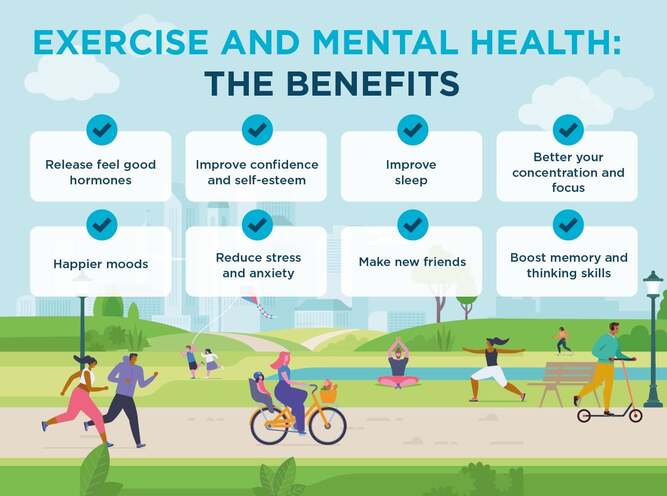
Everyone encounters stress and anxiety at some point in life. Whether it’s from work, relationships, or life changes, these feelings can weigh heavily on our mental health. However, regular exercise has been proven to help alleviate these emotions.
How It Works: The Science of Stress Reduction:
When you exercise, your body goes through a series of chemical reactions that significantly reduce stress levels. Physical activity increases the production of endorphins, which are neurotransmitters that promote a feeling of well-being and relaxation. You may have heard of the term “runner’s high,” which refers to this surge of endorphins after prolonged, moderate to intense exercise.
At the same time, exercise lowers cortisol, a hormone commonly associated with stress. High levels of cortisol over time can lead to a variety of health problems, including anxiety, irritability, and sleep disturbances. By keeping your cortisol levels in check, exercise can help prevent these issues from arising or becoming worse.
How Exercise Fights Anxiety:
Anxiety disorders are some of the most prevalent mental health conditions. Exercise helps reduce the symptoms of anxiety by providing a temporary break from the cycle of worry. Physical activity not only increases your endorphin levels but also encourages mindfulness, a key element of anxiety reduction. When you focus on your movements, breathing, and how your body feels during exercise, it distracts you from racing thoughts and creates a calming effect.
Also Read: Is Working Out EveryDay Bad – Understanding the Risks and Benefits!
Practical Tip:
If you’re feeling overwhelmed by anxiety or stress, engaging in aerobic exercises such as running, brisk walking, swimming, or cycling can significantly ease your mind. Try incorporating at least 30 minutes of aerobic exercise into your routine 3-4 times per week.
Exercise Fights Depression: More Than Just a Mood Booster:
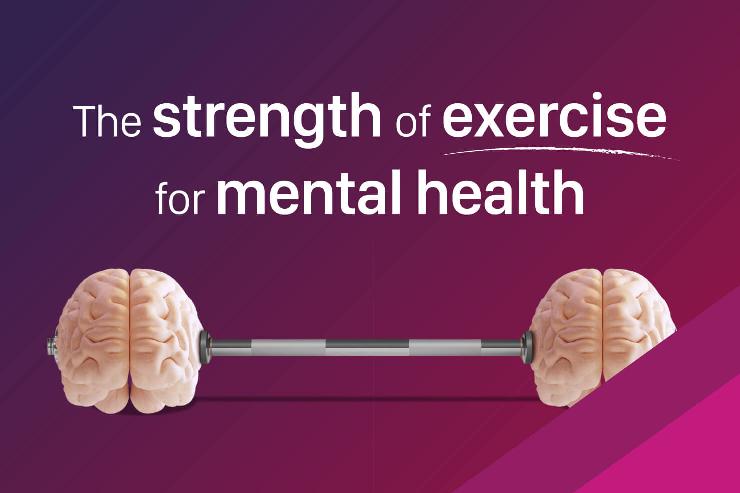
Depression affects millions of people worldwide, and while there are various treatments available, exercise is often an overlooked but effective strategy for managing depression.
How Exercise Helps With Depression:
Several studies have shown that exercise is an effective tool in managing and reducing the symptoms of depression. Physical activity increases the production of serotonin, a neurotransmitter that regulates mood, sleep, and appetite. People with depression often have lower levels of serotonin, and boosting its production through exercise can help alleviate symptoms.
Another way exercise combats depression is by promoting neuroplasticity, or the brain’s ability to adapt and change over time. Exercise stimulates the production of new brain cells, particularly in the hippocampus, a region of the brain responsible for memory and mood regulation. In people with depression, the hippocampus tends to shrink, but exercise can help reverse this process, leading to long-term improvements in mental health.
Exercise as an Antidepressant: The Research:
One landmark study published in The Journal of Psychiatry & Neuroscience found that regular exercise can be as effective as antidepressant medication for treating mild to moderate depression. The study highlighted that people who engaged in regular exercise experienced significant improvements in their mood and overall mental well-being without the side effects associated with medication.
Also Read: Is It Effective To Go To The Gym Every Day – Is It Effective or Risky!
Practical Tip:
Start with moderate-intensity exercises like jogging, swimming, or strength training. Aim for 150 minutes per week, spread out across several days. Consistency is key, so find activities you enjoy and stick to them.
Exercise and Better Sleep: A Crucial Connection:
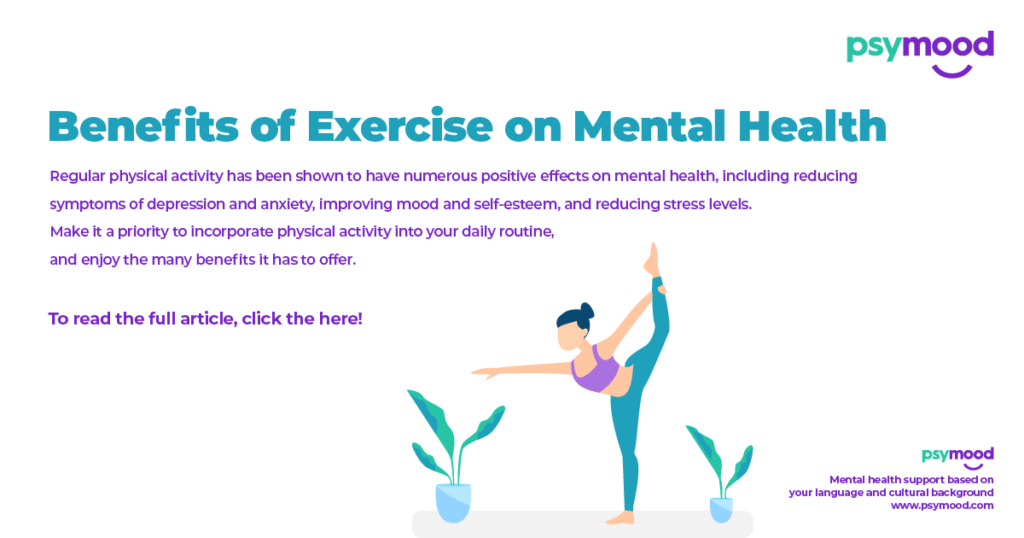
Mental health and sleep are deeply linked. Poor sleep can lead to heightened stress, anxiety, and depression, while good sleep can enhance mood, focus, and emotional resilience. Fortunately, exercise plays a key role in improving sleep quality.
How Exercise Improves Sleep:
Exercise boosts the amount of time you spend in deep sleep, the most restorative phase of your sleep cycle. Deep sleep is essential for your body to repair itself, including your brain, which needs this phase to consolidate memories and regulate emotions. By enhancing your sleep quality, exercise helps improve mental clarity and emotional balance during the day.
Additionally, regular physical activity can help you fall asleep more quickly and stay asleep longer. Exercise increases body temperature, and the post-exercise drop in temperature signals to your body that it’s time to rest.
However, it’s important to be mindful when you exercise. High-intensity workouts right before bed may leave you feeling too energized to sleep, so it’s recommended to finish vigorous exercise at least 3-4 hours before bedtime.
How Sleep Affects Mental Health:
When we don’t get enough sleep, our brains don’t have the opportunity to repair and refresh, which can lead to mental fog, irritability, and even exacerbated symptoms of anxiety and depression. Regular exercise ensures that your sleep is deeper and more restorative, which in turn helps improve mental health and cognitive function.
Also Read: How Often Should You Exercise – A Comprehensive Guide!
Practical Tip:
Low-intensity activities like yoga or a leisurely evening walk can help calm your nervous system, preparing you for a good night’s sleep.
Boosts Self-Esteem and Confidence:
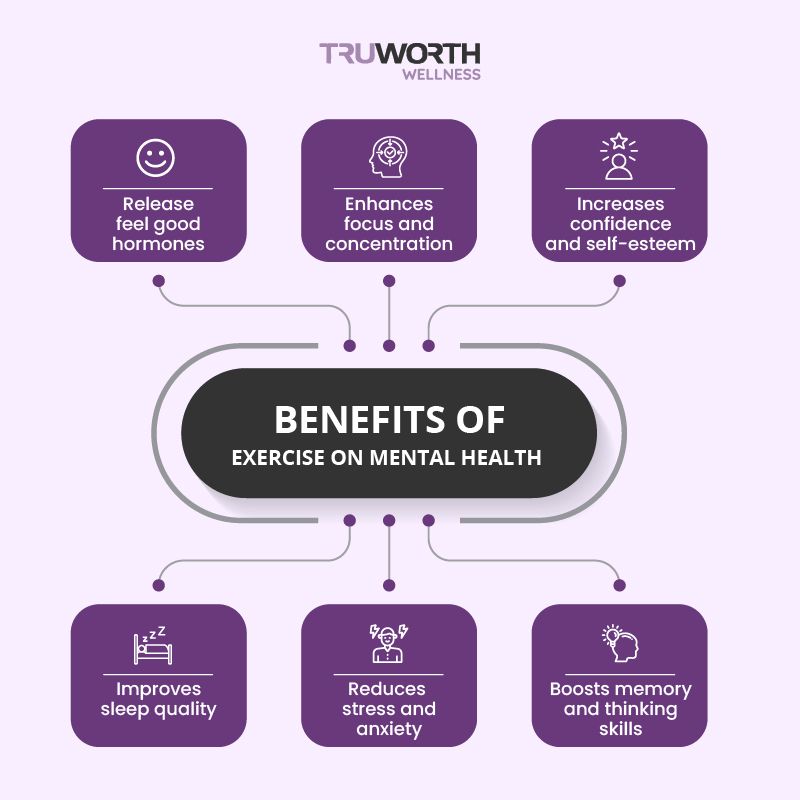
Mental health and self-esteem are interconnected. When you feel good about yourself, you’re less likely to experience negative mental health outcomes. Exercise has a profound impact on self-perception, helping people feel more confident and capable.
How Exercise Improves Body Image:
Many people find that as they begin to engage in regular physical activity, they start to feel better about their bodies, regardless of any changes in weight or appearance. This is because exercise releases hormones that make you feel more energetic and positive. Additionally, accomplishing fitness goals—whether it’s running a certain distance, lifting heavier weights, or mastering a new yoga pose—can create a sense of achievement, boosting your self-worth.
Psychological Benefits of Setting Fitness Goals:
Setting and achieving fitness goals, no matter how small, creates a positive feedback loop. Every time you complete a workout or reach a milestone, your brain releases dopamine, another “feel-good” neurotransmitter that reinforces feelings of accomplishment and happiness. This increase in self-confidence often spills over into other areas of life, such as work and relationships, fostering better overall mental health.
Also Read: What Do You Call Leveling Exercise – A Comprehensive Guide!
Practical Tip:
Focus on setting realistic, attainable goals. It could be as simple as increasing the number of steps you take daily or aiming for a longer walk each week. Celebrating small victories keeps you motivated and improves your self-esteem.
Exercise Improves Cognitive Function and Creativity:
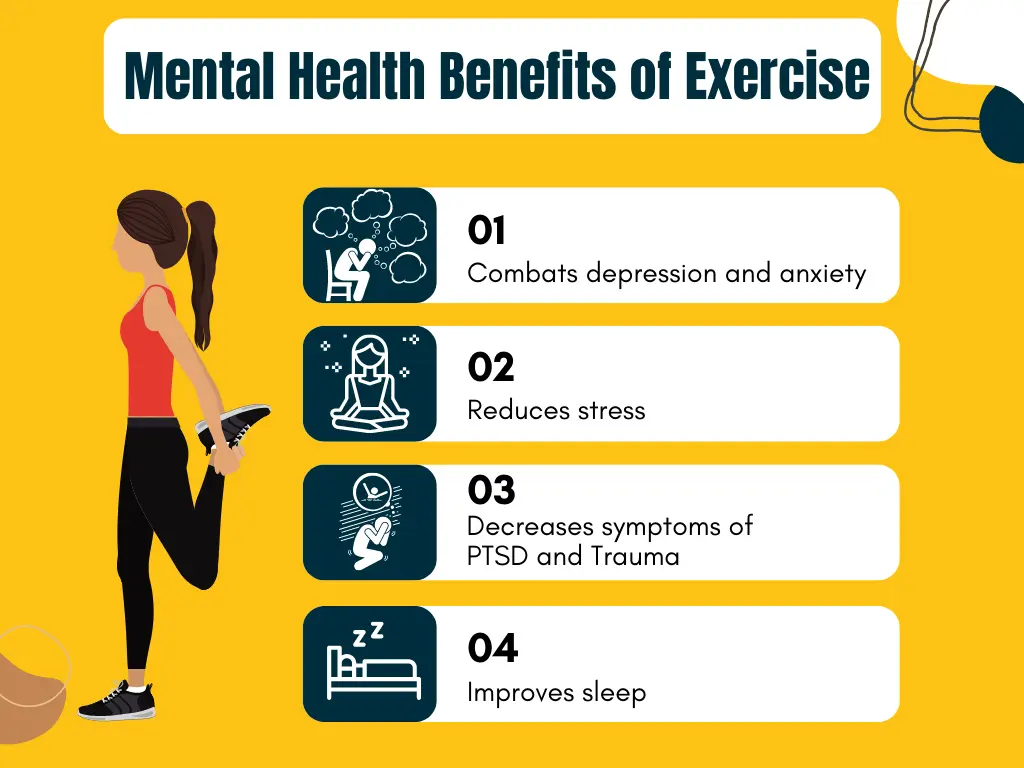
Your body isn’t the only part of you that benefits from regular exercise—your brain does too. Physical activity has a direct impact on cognitive function, improving memory, focus, and creativity.
Exercise Provides Social Connection and Support:
Humans are social beings, and social support is a critical factor in maintaining good mental health. Exercise provides opportunities for meaningful social interaction, which can reduce feelings of loneliness and isolation—both of which are risk factors for mental health problems like depression and anxiety.
Group Exercise and Emotional Well-Being:
Group fitness activities, such as team sports, fitness classes, or group hikes, allow you to connect with others in a supportive, positive environment. These social connections foster a sense of belonging and can provide emotional support. Moreover, exercising with others can increase accountability and motivation, making it easier to stick to your fitness routine.
Also Read: Revolve Fit Guide – Your Ultimate Resource for Finding the Perfect Fit!
Practical Tip:
Join a local sports league, attend fitness classes, or invite friends to go for a walk or jog with you. Combining exercise with social interaction can have a compounded positive effect on your mental health.
Exercise as a Healthy Coping Mechanism:

Everyone faces challenges, and how we cope with stress or difficult emotions can significantly impact our mental health. Exercise is one of the healthiest ways to manage stress, frustration, or anger.
The Benefits of Active Coping:
When life becomes overwhelming, people often turn to unhealthy coping mechanisms, such as overeating, smoking, or alcohol consumption. These behaviors may offer temporary relief, but they can cause long-term harm to both physical and mental health.
Exercise, on the other hand, provides a positive outlet for releasing pent-up emotions. Physical activity allows you to channel your stress in a productive way, giving your mind a break and helping you feel more in control.
Practical Tip:
Whenever you’re feeling particularly stressed or upset, try going for a run, lifting weights, or practicing yoga. Even a quick 15-20 minute workout can help clear your mind and reduce negative emotions.
FAQ’s
1. How does exercise reduce stress?
Exercise increases the production of endorphins and reduces cortisol levels, leading to feelings of relaxation and decreased stress.
2. Can exercise help with anxiety?
Yes, exercise reduces anxiety by boosting endorphins and promoting mindfulness, which distracts from racing thoughts.
3. How does exercise help with depression?
Exercise boosts serotonin production, improves neuroplasticity, and has been shown to be as effective as antidepressants in some cases.
4. How does exercise improve sleep quality?
Physical activity enhances deep sleep, helping the brain repair and regulate emotions, which improves overall sleep quality.
5. Can exercise boost self-esteem?
Yes, exercise promotes a positive body image and increases self-confidence through the accomplishment of fitness goals.
Conclusion
In conclusion, regular exercise significantly improves mental health by reducing stress, anxiety, and depression while enhancing sleep, cognition, and self-esteem. Physical activity promotes the release of key neurotransmitters like endorphins and serotonin, contributing to better emotional well-being. By incorporating exercise into daily routines, individuals can experience both immediate and lasting mental health benefits.